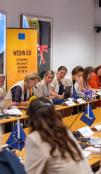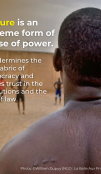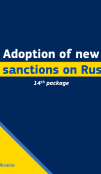FIMI AND DISINFORMATION THREAT IN LATIN AMERICA: A LOOK FROM ARGENTINA

GATHERING FORCES WITH PARTNERS TO TACKLE DISINFORMATION
On April, the EU Delegation in Argentina, in collaboration with the Embassies of Poland, the United States, the United Kingdom, and Ukraine, hosted a Conference on Disinformation and Foreign Information Manipulation and Interference (FIMI) in Buenos Aires.
This crucial gathering in the realm of international cooperation and the fight against disinformation saw the involvement of the Argentine Ministry of Foreign Affairs, with Undersecretary Marcia Levaggi among the distinguished opening speakers alongside the EU Head of Delegation, Amador Sánchez Rico.
The conference featured the participation from the Director of the Strategic Communication Directorate of the EEAS, Aude Maio-Coliche and of Carme Colomina, a renowned disinformation expert from Spain. An audience of over 100 people attended, including Argentinian media representatives, government officials, spokespersons, civil society members, and a diverse group of diplomats. The conference was supported by FPI, the European Commission Service for Foreign Policy Instruments.
UNDERSTANDING THE THREAT
In the EU, to be more precise about the understanding of the phenomena, we qualify it as FIMI, Foreign Information Manipulation and Interference. In Latin America, terminology like disinformation and misinformation, are more commonly used. FIMI, however is more sophisticated, systematic, coordinated and harmful.
Foreign Information Manipulation and Interference (FIMI), is a mostly non-illegal pattern of behaviours that threatens or has the potential to negatively impact values, procedures and political processes. Such activity is manipulative in character, conducted in an intentional and coordinated manner, by state or non-state actors, including their proxies inside and outside of their own territory. Misinformation is false or misleading information shared without harmful intent - though the effects can be still harmful. Disinformation, on the other side, is verifiably false or misleading information that is created, presented and disseminated for economic gain or to intentionally deceive the public, and may cause public harm.
THE ASSESSMENT OF EU PARTNERS
The speakers emphasized the critical importance of international cooperation in countering the destabilizing tactics employed by Russia and other actors, which aim to undermine Western democratic societies by creating or exacerbating social divisions.
A unanimous consensus emerged among the speakers on the magnitude of the challenge posed by FIMI. They underscored the necessity of taking concrete countermeasures that do not compromise democratic principles, including free speech, and the importance of educating the general public, especially in light of the rapid development and use of Artificial Intelligence in the disinformation domain.
ELEMENTS OF THE EU APPROACH
During the conference, the European Union's explained some of the tools used to tackle FIMI and disinformation, particularly through legislative measures like the Digital Services Act and the AI Act, as well as practical tools such as EU vs Disinfo.
A LOOK AT THE FUTURE
The conference sparked significant interest among participants, many of whom expressed a desire to continue the conversation on this vital topic. In response, the EU Delegation in Argentina is considering organizing another event dedicated to FIMI in the future. This would provide an ongoing platform for discussing best practices and fostering exchanges among like-minded partners within the Latin American context, further strengthening the global effort to combat disinformation.
For more information on the EU approach to tackle FIMI: https://www.eeas.europa.eu/eeas/tackling-disinformation-foreign-information-manipulation-interference_en







